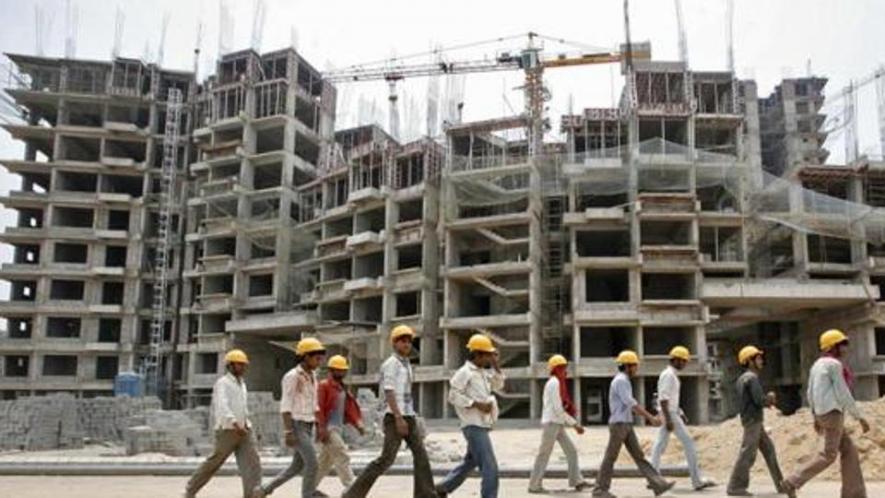Azim Premji University Proposes a Jobs Guarantee Programme for Urban India

Image courtesy: Hindustan Times
With unemployment in India reaching a 45-year-high in 2017-18, the Centre for Sustainable Employment at Azim Premji University, Bangalore, has drafted a plan for a job guarantee programme for urban India.
As per the leaked Periodic Labour Force Survey (PLFS) report of National Sample Survey Organisation (NSSO), the unemployment rate in 2017-18 was 6.1% — the highest in 45 years. In fact, urban areas have an unemployment rate of 7.8%, as per the NSSO data — with open unemployment of around 20% among educated youth. Besides, a majority of the working people in urban India are employed in the informal sector, making their lives precarious.
In an attempt to address this situation, members of the Centre for Sustainable Employment at APU on March 29 released a policy paper titled Strengthening Towns through Sustainable Employment — in continuation with the State of Working India Report (2018) released earlier. The proposal calls for the creation of a National Urban Employment Guarantee Programme for towns with a population of less than 1 million. The aim is to strengthen small and medium-sized towns in India by assuring urban residents a legal right to employment.
There are around 4,000 towns with a population of less than 1 million — inhabited by 126 million people of working age. Workers with varying levels of formal education, up to Class 12, would be eligible for 100 days of guaranteed employment a year at Rs 500 per day.
Also Read: Why an Urban Job Guarantee Scheme is Not a Bad Idea
Workers with formal education beyond Class 12 would be provided apprenticeship in monitoring, surveying, and other similar tasks in public offices, schools, hospitals etc. at Rs 13,000 per month for a contiguous period of 5 months.
“While the first category of work is used to address the question of low-wage informal work and underemployment, the second category is designed to provide skill-building and internship for the educated youth,” said a press statement by APU.
What’s more, the Centre proposes a set of ‘green jobs’ and care-work jobs in towns. “A new set of ‘green jobs’ have also been proposed including creation, rejuvenation, and maintenance of urban commons such as lakes, parks, waste land, and disaster management,” said the Centre for Sustainable Employment. “Further, a set of jobs that will cater to the ‘care deficit’ in towns by providing child-care and care for the elderly and the disabled to the urban working class have been included.”
The proposed programme, to be implemented hand-in-hand with the MGNREGA (Mahatma Gandhi National Rural Employment Guarantee Act) attempts a solution for following problems —
- underemployment and low wages in informal workforce,
- migration to large cities from small towns,
- poor quality of urban infrastructure and public services,
- ecological degradation
- shortage of human and financial capacities of Urban Local Bodies (ULBs),
- unemployment and lack of skills among educated youth.
The National Urban Employment Guarantee Programme shall incorporate the following features of MGNREGA — demand-driven, payment of unemployment allowance if work is not provided within 15 days of demanding, payment of a delay in compensation if wages are not paid within 15 days.
“In light of the 74th Amendment, this programme should be administered by the ULB in a participatory manner by involving the Ward Committees,” the Centre has said.
The programme shall identify projects, prepare annual works plans and implement the programme in a participatory manner by involving the ward committees and ward sabhas.
Around 30 to 50 million people are expected to get opportunities for work under the programme. It said, “The total estimated programme budget would range from 1.7 to 2.7% of GDP depending on whether employment is guaranteed to one adult from every household or every adult resident.”
The Centre proposes that the Union government’s budgeted funds be transferred to the states and to the ULBs upfront in the beginning of each year, “Wage payments, unlike MGNREGA, would be decentralised and happen through the states and ULBs.”
Read More: Elections 2019: Unemployment and Religious Nationalism Are Key Poll Issues, Says Study
Get the latest reports & analysis with people's perspective on Protests, movements & deep analytical videos, discussions of the current affairs in your Telegram app. Subscribe to NewsClick's Telegram channel & get Real-Time updates on stories, as they get published on our website.
























